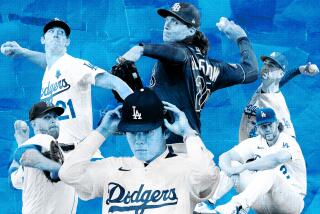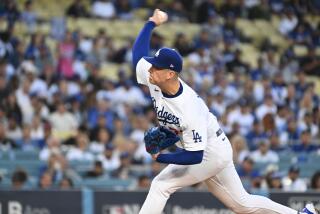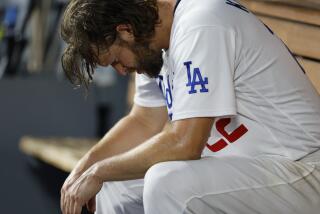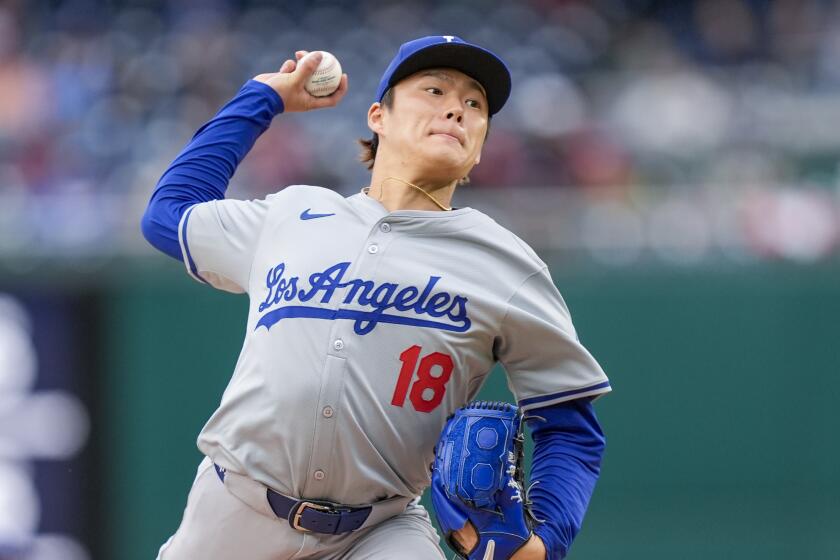Column: Dodgers had the depth to survive key injuries in the past; Kenley Jansen is a different story
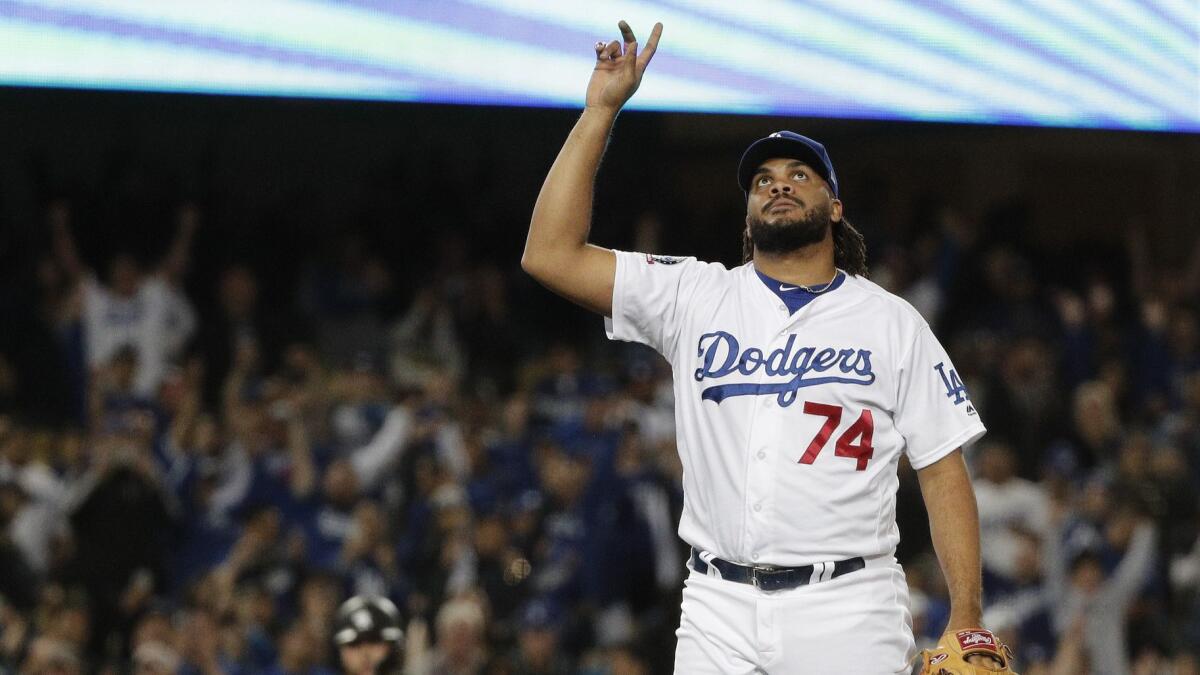
When the New York Mets spent the first pick of the 1961 expansion draft on a catcher, manager Casey Stengel explained why.
“You gotta have a catcher,” he said, “or you’re gonna have a lot of passed balls.”
There was a similar mystery, if not a treasured quip, when the Florida Marlins selected Bryan Harvey from the Angels in the 1992 expansion draft. Why would a team bound to get its butt kicked the first year want a high-priced closer?
“Anytime we’d have a really good chance to win a game, we didn’t want to blow it,” Rene Lachemann, the Marlins’ first manager, said in an MLB Trade Rumors interview last year. “We knew we might only have a chance to win 60 games — so we better have somebody at the end who could save them.”
That brings us, as most things do these days, to the Dodgers’ bullpen.
The inaugural Marlins suffered enough 8-3 and 9-3 losses without their players needing to worry that every 2-1 lead would blow up. The Marlins won 64 games and Harvey saved 45, with a 1.70 earned-run average. He got votes for the Cy Young Award and for National League most valuable player.
This is not just about an expansion team, though.
There is nothing more demoralizing for a major league team than to repeatedly lose late leads, to go from “game over” to “game over?” on a nightly basis. That is where the Dodgers are now, no matter how brave a face the players and their manager might wear.
For years, we wondered whether the Dodgers could withstand the loss of Clayton Kershaw or Corey Seager for weeks, or months. As it turned out, they could.
They lose Kenley Jansen for a week and all hell breaks loose.
In a horrifying way, this illustrates the approach the Dodgers have taken under Andrew Friedman, the president of baseball operations, and Farhan Zaidi, the general manager.
Friedman and Zaidi do not subscribe to the notion that a lot of saves, or the word “closer” before your name, automatically makes you a premium relief pitcher.
For the few truly elite relievers, Jansen among them, the Dodgers are willing to pay up.
For the rest it’s mix and match, and high spin rates, and throw a bunch of arms against the bullpen wall and see who sticks.
The performances tend to be so volatile, or so the argument goes, that long-term contracts usually do not pan out. The Dodgers certainly have shown no hesitation to shuttle relievers to the minors, and shuffle them off the roster entirely, with the exception of the seemingly curious affections for Pedro Baez and Chris Hatcher.
The Dodgers might not realize how incredibly fortunate they have been with Jansen. From the time he became their full-time closer in 2012 until last week, he was on the disabled list once: with a foot injury, for the first month of the 2015 season.
No shoulder injuries. No elbow injuries. No time missed in a pennant stretch or in the postseason.
In this day and age, that is quite the trifecta. Without that combination of Jansen’s excellence, durability and consistency, the Dodgers would not have had the luxury of playing for October while still waiting for months for the likes of Joe Blanton, Brandon Morrow and Grant Dayton to emerge.
The Dodgers survived the injuries to Kershaw and Seager because the depth was arranged in advance, not claimed on waivers. The bullpen is a blue house of cards that appears to have collapsed when Jansen was removed from the deck.
The solution could have been to spend money on relievers beyond Jansen, although the Dodgers’ owners complicated matters with a self-imposed salary cap, because of their reluctance to pay a luxury tax this year.
But the Colorado Rockies spent $106 million on proven relievers last winter: closer Wade Davis and setup men Jake McGee and Bryan Shaw. None has an earned-run average below 5.00. At the July trade deadline, the Rockies added one player: a reliever, Seunghwan Oh.
The Dodgers spent on proven relievers, too, under former general manager Ned Colletti, with long-term contracts awarded to former closers Brandon League and Brian Wilson. Both were released before their contracts ran out.
In the previous decade, the Angels won the American League West five times in six years, in no small part because of a durable and reliable setup man, Scot Shields. Unsung eighth-inning heroes such as Shields and the more contemporary Darren O’Day and Joe Smith are hard to find, and hard to keep, because another team might woo them in free agency with a closer role, and closer money.
All is not lost for the Dodgers, although you might not have known it from online forums and talk shows. The Dodgers entered the weekend two games out of first place in the National League West, and Jansen could return from his heart scare as soon as next week.
The loud voices demand that Friedman and Zaidi be held accountable for the bullpen calamity. Of course they are accountable. Who else would be? (Don’t say Dave Roberts, as Friedman and Zaidi provide the pitchers.)
But, you know, these same men steered the Dodgers to Game 7 of the World Series last season. This season is not over yet. Friedman and Zaidi need not be fitted for Speedos and sent to sit atop the dunk tank today.
One game could make a difference, and not just here. If the Atlanta Braves miss the playoffs, they’ll have to live with the decision that manipulating the service time of phenom outfielder Ronald Acuna was more important than fielding the best possible team for 2018. If the Dodgers miss the playoffs, they’ll have to live with the decision to sign Tom Koehler rather than Tony Watson.
The timing of the bullpen collapse is awful for certain Dodgers executives, but Friedman and Zaidi are not the ones. On the day after the Jansen-less bullpen left a late-inning mess for the seventh consecutive game, fans received email invitations to renew season tickets, and the accompanying invoices.
“From magical moments on the field to the Dodgers hosting rivalry series against the Giants, Cubs and Yankees in 2019 and the 2020 All-Star Game, it’s an exciting time to be at Dodger Stadium,” the letter read, “and we don’t want you to miss what’s next!”
No runs for the other team in the eighth and ninth innings would be a good start.
Follow Bill Shaikin on Twitter @BillShaikin
More to Read
Are you a true-blue fan?
Get our Dodgers Dugout newsletter for insights, news and much more.
You may occasionally receive promotional content from the Los Angeles Times.

